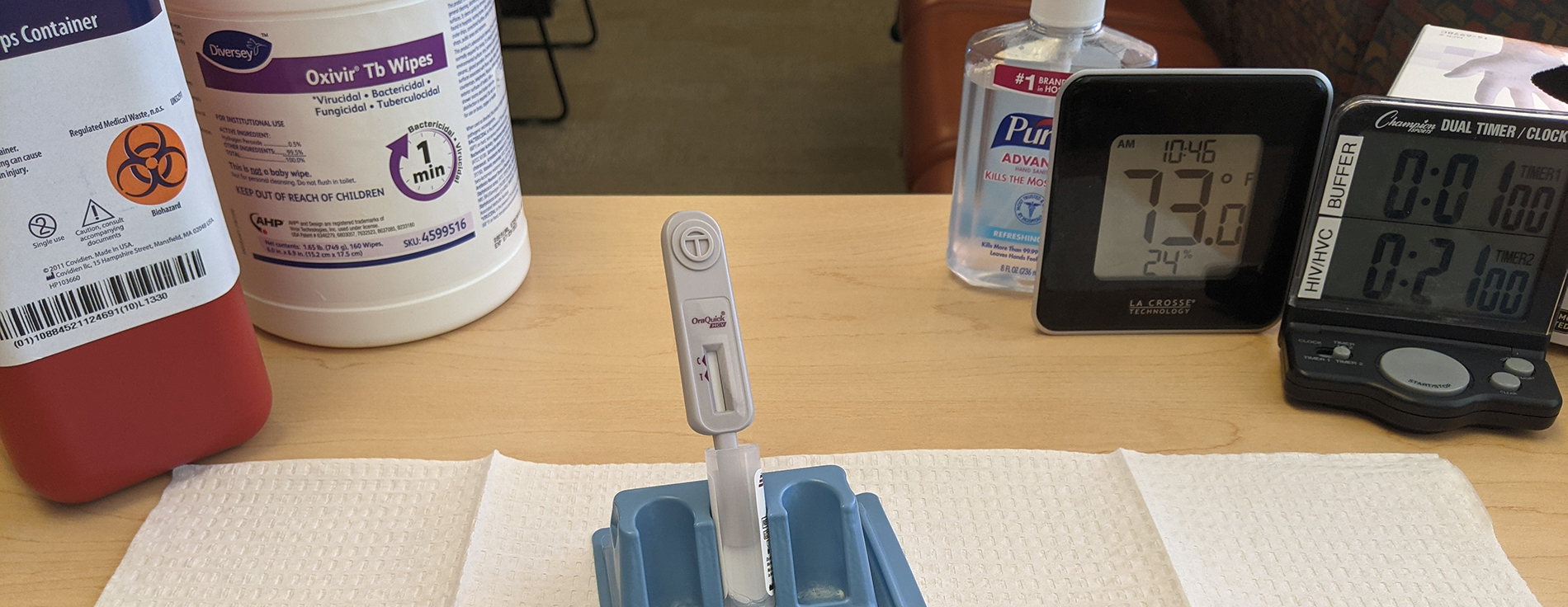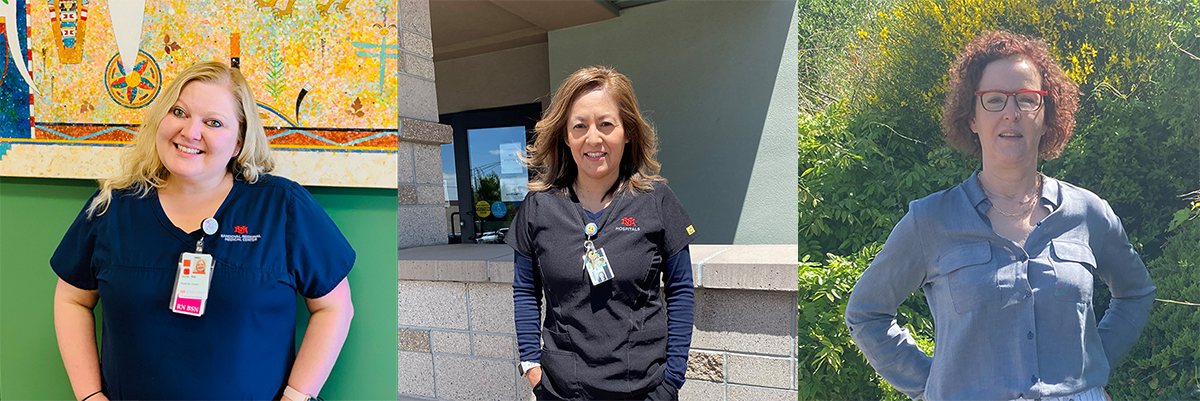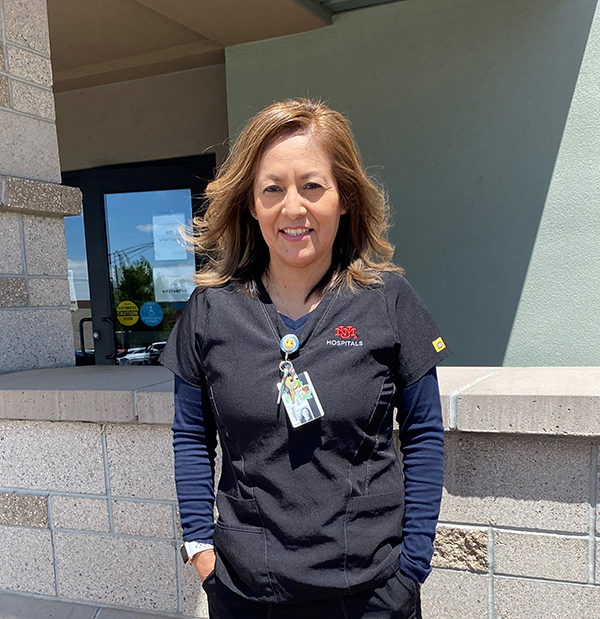Preparing for Disaster: UNM Hospital Participates in Region-Wide Emergency Training

Care for a Cure
UNM Nurses Are Working With Patients to Eradicate Hepatitis C in New Mexico
For University of New Mexico Health nurses who work with patients diagnosed with hepatitis C, part of the job entails educating patients that there is a cure for the virus, and that it can be as simple as taking a pill every day for eight to 12 weeks.
But there are hurdles. Nurses find they have to convince patients that the treatment has drastically improved over the last several years.
“It used to be really onerous, it used to take six months to a year, and the drugs made you sick,” says Deborah Parris, RN, with UNM Truman Health Services.
“Sometimes it takes a little bit of discussing with patients to assure them that it is nothing like it used to be, that someone can get cured – completely cured – within eight to 12 weeks. The medication is very tolerable. There's a lot of horror stories of the days when it was difficult, and a lot of people still think it's like that.”
Hepatitis C is the most common blood-borne disease in the United States, according to the New Mexico Department of Health. There are no symptoms until the virus has progressed to liver cancer or cirrhosis, and New Mexico has among the highest rates in the nation for both of those diseases.

Colleen Chávez, RN, is program coordinator for the UNM Hepatitis C Elimination Project, which has a goal of eliminating hepatitis C in New Mexico by 2030. “It’s a big deal,” she says. The project is working on raising awareness throughout May, which is National Hepatitis Awareness Month, Chávez says.
May 6 – May 12 is National Nurses Week, which honors the hard work and dedication of members of the nursing profession.
“I am really thankful to our nurses who play such a central role in keeping our patients engaged in care and really providing that assurance that's needed to bring them in and keep them in for care,” Chávez says.
The project is a new initiative designed to screen UNM Hospital patients for the virus. Those who test positive are immediately connected to services. Making hepatitis C testing and care accessible to patients in their providers’ office is also part of the plan. Patients, she adds, should feel comfortable asking their provider about it.
“The more we name this, the more we normalize it, then the more we can peel away a lot of the stigma that's associated with hep C,” Chávez says.
“We’re really trying to build a partnership with OB-GYN because we know that women, and particularly women of childbearing age, are really affected, and we don't tend to talk about that,” Chávez says. “That's pretty critical and we need to create that link, and we need to make sure that we're taking care of their babies.”
Some patients, some of whom use needles to administer drugs or who misuse alcohol, aren’t ready for the treatment.
Debbie Telles, an RN in the UNM Center for Digestive Diseases and in the Viral Hepatitis Clinic, says that by the time patients come to clinic, they’re often being treated for severe liver disease in addition to hepatitis C.

I have the ability to make a difference in these patients’ lives, as far as helping them to get cured from hep C
“I have the ability to make a difference in these patients’ lives, as far as helping them to get cured from hep C,” Telles says.
But getting some patients to stick with the treatment for the entire time is difficult.
“There are some patients who are just not ready,” she explains. “They want to get treated and cured from hep C but they find that it's difficult to adhere to the treatment, to take the medicine every single day. We do have quite a few patients that are that are homeless. Staying in contact with them is challenging. We do our best to try to keep them engaged for as long as they can.”
A key part of what the nurses do is educate the patients.
“If it’s untreated it can lead to cirrhosis or liver cancer or death,” Telles tells newly diagnosed patients, urging them to seek care before the disease progresses. “It's powerful, because patients really want to take charge of their health and they really want to turn (their lives) around,” she says, and it’s especially true of patients who have been incarcerated.
Parris of Truman Health Services says another challenge is navigating the health care system and seeking insurance coverage for the treatment. “I really do a lot of work helping with insurance and with getting the medications from the specialty pharmacy,” she says.
June Gallegos, an RN at UNM Sandoval Regional Medical Center, works in family practice and the hepatitis C treatment clinic.
“Treating hep C is very dear to my heart because I have a loved one who was treated and now is completely healed from it,” Gallegos says.
Getting to know the patients and their families through the duration of the treatment is enjoyable, she says. “It’s very rewarding seeing them at the end of treatment. It's just priceless. They’re so happy to be free of this virus that's the silent killer.”
The Truman Mobile Testing Unit will offer free, confidential, rapid testing for hepatitis C and HIV on May 19, 2021, at the UNM Southeast Heights Family Health Clinic, 8200 Central Ave. SE in Albuquerque. Participants get on-the-spot results, and those who test positive will be connected with health care services.
UNM Truman Health Services also offers walk-in testing. Call 505-272-1312 for more information.